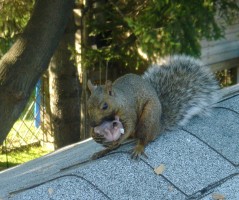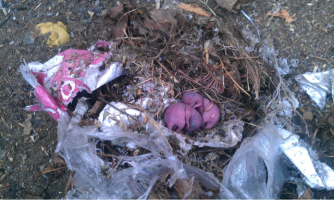
Because all squirrels are mammals, their reproductive behaviors are somewhat similar, but issues of gestation, litter size and mating can vary from species to species. The most common species Skedaddle Humane Wildlife Control deals with is the Eastern Gray Squirrel.
Most female gray squirrels begin their reproductive life at 1.25 years of age but can bear young as early as 5 and a half months. Females may bear young twice a year for more than 8 years.
When females are in estrus, meaning they are ready to mate, they attract males with their scent. One or more males will vigorously chase and compete among themselves for a mating opportunity. The hierarchy of male squirrels can be observed, as the dominant male is typically the one that will mate with the female. Females may mate with more than one male as well.
Two breeding periods occur within a population, one in late winter, and another in mid-summer, with litters born in March-April and July-August. Adult females who are two years of age or older may bear one or two litters per year; yearling females only once.

After a gestation period of 40-44 days, the female bears her litter of 1 to 9 (average 2 or 3) in a den or leafy nest, or your house! The hairless baby squirrels, called neonates are blind and weigh about 14-15 g (0.5 oz). They mature quickly, developing hair by three weeks; at four weeks the tail is well furred. Their ears open by four weeks and the eyes a week later. By eight weeks the young squirrels are venturing out of the nest for short distances. Weaning, or making the transition from the mother’s milk to other food, begins at this time and at about 12 weeks the youngsters will be almost adult size and quite independent of their mother.
Squirrels prefer to make their nests in the hollow of trees. Squirrel nests are made of leaves and twigs and are called dreys. When squirrels can’t find a suitable tree to make a nest in, they look for the next best thing, your chimney, walls or attic. This is why it is so important to have prevention work done on your home to make sure it is not vulnerable to a squirrel invasion.
The prevention work process is much easier and more affordable than dealing with an attic full of baby squirrels! Of all the animals that Skedaddle Humane Wildlife Control deals with, squirrels are the species that are the most capable of inflicting damage on homes. They can chew electrical wires, causing fire hazards, damage insulation with feces and urine, chew shingles and wood, etc.
Squirrel baby season is right around the corner. Call Skedaddle Humane Wildlife Control today to make sure your attic or walls won’t be playing host to a family of squirrels! 1-877-222-9453
We remove squirrels in from homes and business in: Mississauga, Oakville, Burlington, Hamilton, Niagara, Kitchener-Waterloo, Cambridge, Guelph, London, Ottawa, Montreal and Halifax, St. Catharines, Brampton


